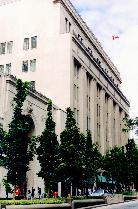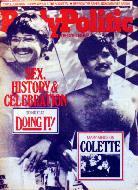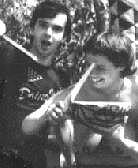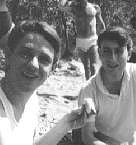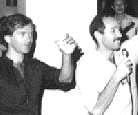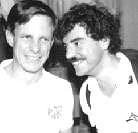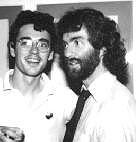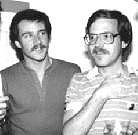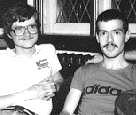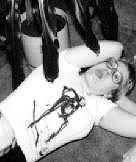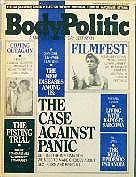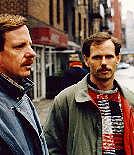|
Promiscuous |
|
TBP's Trials Act One, Scene Two (& intro to Scene Three...)
Appointment less grand:
|
"Men loving boys loving men" again. Acquitted again. Appealed again.
Regina vs Pink Triangle Press becomes "the most appealed summary case in the history of mankind."
1982
May 31 through December
- "COME ONE, COME ALL!
Witness TBP Trial No. 2
Admit One / Last Performance! (We hope!)"Featuring The Phenomenal Bozo the Crown, leaping through loopholes and turning cartwheels on the constitution VS The Debt Defying Body Politic Troupe
"College Park (at Yonge) / Monday, May 31st and Tuesday, June 1st
Courtroom 503 (2nd floor) / 10 am and 2 pm"
Paul Aboud did that, an invitation illustrated with a medieval Italian clown. I'm amazed we didn't get a contempt citation out of it. But during that second "Men loving boys" trial, Bozo the Crown did seem a bit forlorn. Despite material still in hand from the 1977 raid, prosecutor Peter deJulio offered no new evidence. Testimony went on not for two days but three and a half. The Crown called no witnesses; we called 15, more than in our first trial in 1979.
But the atmosphere was less charged: the College Park courtroom was modern, smaller and less grand than at Old City Hall; there were no odd encounters in hallways with the likes of Claire Hoy or Ken Campbell. Even those halls felt more an airport lounge than the antechamber of Justice: not ancient benches but shiny plastic chairs; no bawling baliff to summon the accused, just a mellow voice on the PA: "Would those having business in Courtroom 503...."
Still, Judge Thomas Mercer did exhibit much the same wry amusement Sidney Harris had shown in 1979. A tape of a CBC Radio "Ideas" program was admitted despite objections from deJulio; it included not only Gerald Hannon but lesbian performer Meg Christian, singing about her gym teacher with a crowd of rowdy dykes cheering her on. "That part," Judge Mercer noted with a small smile, "wasn't in the transcript."
After the Crown's final, feeble summation, Mercer acquitted Ken, Gerald and Ed on the spot: the prosecution had failed -- in fact, hadn't even tried -- to prove their personal responsibility for the article's publication. Their names in the masthead and even their role as directors were, the judge said, mere hearsay. That left the Press alone potentially liable. Mercer's verdict on that was set for June 15. And on that day it came: Not guilty. Again.
And, again, the Crown appealed.
On July 13, citing "errors of law" in Mercer's judgment, they sought to overturn the Press's acquittal, though not Ken's, Ed's, or Gerald's. Now we went on about triple jeopardy. Clayton Ruby called Regina vs Pink Triangle Press "the most appealed summary case in the history of mankind."
On July 19 a Globe and Mail editorial asked: "Does the Attorney General's office intend to go on prosecuting until it finds a court that will convict? Does it think that is justice?" Even Ken Campbell came to our defence: "I can see that someone in the government of Ontario is out to deny the fundamental human rights of homosexuals, and the right to publish for them."
McMurtry said the appeal might be heard by December. But they were in no hurry: it would be September 1983 before they finally went, again, to court. We would be back before then, of course, to test the obscenity of fistfucking.
|
Doing It all over town & going Wilde to boot
Danny & David Doing It!
On the beach:
At the movies:
And at a party:
|
Details on what everyone did at Doing It! & Wilde '82 (at least officially) are in the CLGA.
- "ACTIVISTS PREDICT MASS BOREDOM!
"Three drop dead just talking about it!"The National Enquirer has never covered gay conferences, but as one cheeky newswriter for this magazine joked, that might have been their lead if they had.
"But not this time. Doing It! surprised everyone."
That's how we led off six pages of coverage in TBP's September issue on the first national gay gathering since Calgary's in 1980. From June 26 to July 4 (taking in Toronto's Lesbian and Gay Pride celebrations, revived by the bath raids, this the second since), Doing It! was not a conference but a festival.
It was also more than national: 350 men and 106 women showed up not only from across Canada but from eight US states and seven other countries. There were events all over town: performances; parties; panels on "The Big Four," on street theatre, spirituality, genderfuck; and an exhibition of works by local art fags and dykes curated by Norman Hay, its title his favoured word: "Celebration."
On top of this were 20 presentations, seven with slide shows, by lesbian and gay scholars here for the world's first international gay history gabfest. It was called Wilde '82, marking the centenary of Oscar Wilde's 1882 visit to Canada.
The lead page carried a big picture from the final day: everyone collapsed half naked on the beach at Hanlan's Point. "Interprovincial and international liaison," I wrote, "was the order of the day. And night."
Michael Wade had a crush on historian Allan Bérubé. I was after a sweet little guy from Northern Lambda Nord, a group spanning the border of Quebec and Maine (I didn't get him). Everyone fell in love with Vito Russo, author of The Celluloid Closet: Homosexuality and the Movies, here from New York for a film panel.
We also got a film of our own, Track Two, a documentary by Jack Lemon, Harry Sutherland and Gord Keith on the growth of Toronto's gay community. By sheer luck of production timing it managed to include the bath raids and demos. At its July 1 screening a man said: "I feel like marching through the streets right now, this time not from anger but from joy."
I felt joy too, at the whole thing,
Not that I always minded: late one night its chief organizer Philip Fotheringham (boyfriend for some time to Robin Hardy) came to give me his usual goodbye squeeze at the typesetter. I turned in my chair, got his cock out and and sucked him stiff. Usually frenetic, Philip did slow down long enough to come.
But my final shift getting that issue to bed had run 44 hours nonstop. The day it came back from the printer we had an emergency meeting about finances, things in bad shape, and talked about layoffs. We wouldn't stop working, of course, we'd simply stop getting paid and go on temporary unemployment insurance. We had done it before, during a cash draining postal strike in 1981 -- a benefit then with Vito Russo helping pull us out of the hole.
UI benefits wouldn't start for eight weeks. My line of credit had disappeared in March, the last casualty of The Upper Crust. I was bankrupt. I didn't know how I would even eat for the next eight weeks.
- Letter to Jane Rule, June 27, 1982:
I finally began to resent how much we seem to expect each other (and ourselves individually) to sacrifice, and came in Sunday to write a memo to the collective (two thirds of whom are staff also facing potential poverty), saying I wasn't willing to do it, didn't think others should be either, and that we'd have to find other ways to get through the crunch -- anything but the groundless assumption that we can afford to live on nothing.
I felt I had to draw the line, but I also felt torn doing it: that line cuts right down the middle of my self identification with this place and the paper. I had to say NO to it -- and to that part of myself that is of it and is willing to do anything for it.
The complexity of this emotion was fed on Friday night, when we got a preview screening of Track Two. It took everything I lived through and gave it back to me, somehow validated for having been filmed, reordered and flashed back at me on a big screen.
It all said: yes, this is what you're doing, this is the real immensity of it, this is the burden you bear. And you do it because you've assumed your right to the world and you've tried to live it, and having done that you can hardly imagine living any other way. Yet it asks so much. And keeps asking more and more and more all the time.
Most of the time when it asks, I say yes -- we all do -- because that yes is a yes to my own power, to our collective power over who we really are and how we want to be. Having spent the day assessing what those yesses cost me, having wanted to preserve something of myself, I was literally overwhelmed by the vision of this huge, strong, profoundly good and profoundly burdensome responsibility we've taken on.
I could hardly talk to people after the screening without feeling I was about to break into tears. I wanted to crawl into a corner and cry out of a contradictory sense of immense joy and, at the moment, even more immense fatigue.
We did find other ways around that crunch, including part time pay pending stints on pogey; it wasn't the last time we'd depend on it. But the strain soon had its effects on life beyond the office.
In May Michael Wade and I had to move, the city declaring our place at 43 Simpson uninhabitable, the ceilings too low (though we were not the last people to live under them). Ward Beattie and Terry Farley offered us the top floor of their huge Victorian pile at 784 Euclid Avenue. It was one big room; we shared their kitchen and bath.
It was quarters too close for Mikey and me, my shadow even more unavoidable. For weeks he put nothing of his own up on the walls. When I finally took one for a few pictures of mine, he resented it. He went away to Hamilton one weekend; I was guilty at feeling relieved, but I did. I even, for the first time in ages, brought someone home.
Michael's affairs never got in the way, nor mine -- but for mine with The Beep. We were in each other's way. We both needed space, emotional as well as physical, that we couldn't get living together. In August we decided not to.
- Michael Wade's journal, Tuesday, August 3, 1982:
"After getting past the romance of loving someone, all that is left is the caring. The caring dangles in a void without any context connecting it to the rest of a life. It is a responsibility that must be taken up -- delicately, patiently. It signals the alteration of a relationship; necessitates it.
"This is what Ricky and I were discussing last night, sitting on a mattress, staring at the wall across from us.
"'I know that loving you is a great responsibility,' I told him. 'But lately I find myself asking, a responsibility for what? What do I gain by the sacrifices? And to tell the truth, there isn't much.'
"'I know,' Ricky said. 'I feel the same.'
"We both realized, at that point, that this couldn't go on, with me ending up disheveled, with Ricky proud and knowing. With both of us ashamed.
"'What do you think, then?' Ricky asked.
"'I want to move out. To be honest, that's what I want.'
"We were quiet for a while, holding each other's hands. Then Ricky said, 'It would have been nice if it could have lasted longer. But it can't.' Ricky hid his eyes in my shoulder. 'I love you,' he told me.
"'I'm always afraid of hurting you,' I told Ricky.
"'You're not hurting me,' he said. 'I just remember when we were living on Simpson and I'd be walking home and look up at the window and see that light on and it felt so good that Mikey was home, that I would come home and see you were there by that light.'
"Ricky put his head on my chest and started crying. I began crying too. I remember that light, that February warmth.
"I'm so young, Ricky; what a thing to know. I love you for this above all, for the grace of our love."
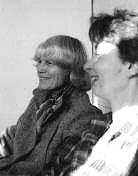
"Really to greet,
Mary's 1991 book, In the Company of Strangers, recounted the production of Cynthia Scott's film (of nearly the same name) in which Mary, then 71, appeared along with seven other women, all but one older than she, on a bus tour suddenly stranded in rural Quebec. Both film & book were wondrous explorations of odd & surprising friendships.
Mary Meigs died, in Montreal, in January 2003.
|
- "'If you're such a chicken shit that you can't stand up to me,' Ricky said back in February, 'you might as well leave.' I couldn't leave, knowing that he'd been able to call me chicken shit, still feel superior, label my life for me."
I shamed him out of it, shaming myself doing it; as he said, both of us ashamed.
That February, Michael Lynch had been writing about Mary Meigs, a painter who, at 61, never thinking she could write, had written her own life as seen in the frame of another. She called her autobiography Lily Briscoe: A Self Portrait, Lily the painter in Virginia Woolf's To the Lighthouse who is always told: women can't paint; women can't write.
Mary's constant theme in that book was friendship, so central to so many gay lives, friends often more constant than lovers -- yet a state we rarely ponder.
Michael Lynch had recorded in his own journal, in the wee hours of February 9, the end of his latest love, "a year, a month & two weeks" with John Klintworth, a handome young curator. "Klint & I just talked & he'll move out. Can't live here & be himself. Can't live here & grow."
Michael called his piece on Mary's book, appearing in The Body Politic's March 1982 issue, "an appreciation."
-
"Self-realization among equals, resistant and respectful, motivates the book's most dazzling writing -- about friendships: between lovers, ex- lovers, non- lovers.
"On the last page: 'The thought of death, with its certain and imminent coming, should be a call to shake off the fetters that keep us from being alive; a call to refuse to accept those pernicious and recurrent deaths of our most living selves that kill us as surely as any disease.'
"In teaching herself 'really to greet, really to say goodbye,' she has a lot to offer us who live in the brave and brash new gay world. As our lesbian and gay male subcultures emerge, we have opportunities as never before to live fully gay defined lives. We sophisticate our institutions, our leisure activities, our sexual proficiency, our living arrangements.
"But still, I feel, we shiver, unsure, when facing relationships that grow or fail to grow. We hunger for ways to be better lovers, deeper friends. We long for trust and true companionship even as our tricks become our lovers and our lovers become our... what?"
Typesetting that one very late, very cold February night, I sat back from the machine and cried. Michael Wade and I would find our "what" -- if, like so many of us, never quite finding a name for it.
Whatever it was, for a while this thing had no other name. Some tried GRID, then ACIDS. Then the scientists came up with AIDS.
It was an awful acronym. But once we had AIDS, we were stuck with it.
He was not alone in being ill with a rare and unexpected disease. Intimations that something odd was going on had first come (to all but those affected) in a July 3, 1981 New York Times story: "Rare Cancer Seen in 41 Homosexuals."
The Body Politic first covered the story in a September 1981 World News item, mostly focussing on media misreporting. In the next issue Bill Lewis and Randy Coates, both medical researchers, took much the same approach in a full page piece called "Moral lessons; fatal cancer." That got a cover draw using the term "gay cancer" -- without quotation marks. The same term appeared in another international news story in the May 1982 issue.
At the time this condition, whatever it was, had no other name. It was briefly called GRID: Gay Related Immune Deficiency. To clean it up politically, some called it ACIDS: "A" for Acquired; "C" for Community and "S" for Syndrome. On July 27, 1982 a scientific conference in Washington settled on Acquired Immune Deficiency Syndrome: AIDS.
"AIDS" was an awful acronym. Its "A" could be brayed to rhyme with "gay"; its "S" hissed in sissy sibilance. Both would be. Accused of abducting that nice little word "gay" for immoral purposes, we had now forever tainted legal aides, health and beauty aids, even a diet drug called Ayds.
It also rhymed with that well known insecticide, Raid -- the one that "kills bugs dead." In time we'd see a variant of that slogan, and one no surprise.
The term seemed a bad joke, particularly "Syndrome": a condition, not the disease behind it -- whatever that might be. We would see (and practise) endless pedantry: AIDS is not a disease; You can't "catch" AIDS; and, once a virus was discovered, it wasn't "the AIDS virus." No one paid any attention. Once we had AIDS we were stuck with it.
|
The real gay epidemic Panic & paranoia
TBP's Nov 1982 issue:
|
"All this 'panic' is because gay men are dying!
"By refusing to see that the promiscuous lifestyle is potentially fatal, we may permit the ultimate triumph of the Moral Majority: we will kill ourselves."
Michael Callen
New York AIDS activist,
in a letter to TBP.
Those joint articles covered 10 of those pages, almost solid with type. Michael's was called "Living with Kaposi's." Some quotes:
- "Gays are once again allowing the medical profession to define, restrict, pathologize us. What used to be a psychiatric pathology is now an infectious one. ... This panic could never have set in so quickly and so deeply if within the hearts of gay men there weren't already a persistent anti-sexual sense of guilt ready to be tapped."
Michael described an interview in New York's Christopher Street with a man who had Kaposi's: "The key message was guilt and punishment. He described a life of parties, discos, 'endless functions,' 'Island fever,' and concluded with: I wanted more. I must pay. I have paid."
He quoted a New York doctor in the US mass market mag Us: "Promiscuous behavior can only increase the risk of disease. That's why gay men must turn one night stands into longer relationships." Elsewhere that same doctor had said: "Eventually, some restrictive measures may have to be imposed."
People were ready to indict almost any aspect of "life in the fast lane" as a direct cause of AIDS. Bill Lewis in his piece, "The real gay epidemic: Panic & paranoia," wrote:
- "Until recently, the cause of the collapse of the immune system was baffling, and everything gay men did that straight men didn't was dragged forth as a possible cause. Abundant sex, poppers, fisting, drugs, ingestion of too much sperm, staying up too late -- all have been put forward as an explanation."
Some of these activities could reduce immune function, but none could explain cases of AIDS among nearly celibate gay men, hemophiliacs or, soon, children. Bill and many other researchers had come to believe there must be an infectious agent, a virus. Based on patterns of infection it was likely transmitted by blood, much like hepatitis B -- a disease we knew how to prevent.
It was time, as Bill, Michael, and part of the cover draw for their articles said, to get "the information we need to make choices about sex, risks, and being ill." Big type in the main draw read: "The Case Against Panic."
Panic ensued nonetheless, American panic the most fervid. The next few issues had nearly four pages of letters responding to Michael Lynch and Bill Lewis, only two from Canada and only two (not the same two) supportive, some full of scathing condemnation.
Noted New York AIDS activist Michael Callen set the tone: "I have to point out that all this 'panic' is because gay men are dying! ... By refusing to see that the promiscuous lifestyle is potentially fatal, we may permit the ultimate triumph of the Moral Majority: we will kill ourselves."
|
Pioneers
Michael Lynch & Bill Lewis:
|
"What did they mean, 'Do this in your own homes'? How can you grope a stranger in your own home?"
Gay man in LA
on police sex advice offered
in a bar raid.
Attraction to strangers was deeply rooted in our culture. Now, in the name of "health," we were being urged to xenophobia.
|
TBP's Trials Act Two (climax -- & finale)
Same issue; different issue:
|
"Lust" goes bust: Not guilty after less than a day's trial. No appeal -- so a celebration.
I was in no mood, clearly unwell. At my doctor's I'd turn & turn, he looking worried, looking for lesions. None. Tested for mono & other infections: all negative.
- "...we have to grasp a significant but little discussed aspect of gay male promiscuity: its tendency to create a collective consciousness. It is the search for new sex partners that brings large numbers of gay men together in bars, baths and even parks. This concentration of numbers in relatively small areas is precisely the circumstance which make political organization a possibility for gay men.
"Promiscuity knits together the social fabric of the gay male community; the imposition of widespread marriage- like coupling inevitably goes hand in hand with the abolition of that community."
In the May 1981 issue, after the bath raids, TBP regular Gordon Montador, then living in Los Angeles, had written of a raid on a bar there. One policeman had said: "Listen. This is a public place. Keep your dicks in your pants. Do this in your own homes." A gay man asked later: "What did they mean, 'Do this in your own homes'? How can you grope a stranger in your own home?"
Attraction to strangers was deeply rooted in our culture. Now, in the name of "health," we were being urged to xenophobia.
Bill Lewis had quoted Ken Popert's "Promiscuity knits" line; Michael Callen had responded: "but this lifestyle is clearly killing us. We must begin the enormous task of changing the ways in which we define ourselves and the ways in which we have sex."
About that last part Michael Callen was right. But changes would come not in denial of ourselves, our communities or even our promiscuity, but in celebration of the strengths and skills we had learned in our own xenophilic gay lives. Our responses to AIDS in Canada would be quite different from those in the US: less dependent on "professionals"; more rooted in community; more trusting of choice than of coercion, guilt, or fear -- and much less afraid of sex.
Michael Lynch and Bill Lewis set that course with their ideas. They would carry it on with their lives.
The "Fisting Trial," as we'd come to call it, began on November 1, set to run for three days. It lasted less than one.
We got Judge Mercer again, and again amused: reading the cover draw on the April 1982 issue, "Fisting etiquette," he said he'd expected a piece about boxing. The Crown hadn't tried to root out Angus MacKenzie, all fantasies of braving contempt charges blessedly dashed.
With court in session for mere minutes Mercer looked at the gang of us in the dock and said, "Why are these nine people sitting here?" He ordered us to stand and acquitted us right there, using the precedent he himself had set in the May "Men Loving Boys" trial: our names on the masthead were not evidence of guilt. We sat down, leaving the Press alone still standing charged.
At one point Clayton Ruby called us together and said he would try claiming that fistfucking could not be, as the obscenity statute read, "undue exploitation of sex" -- because it wasn't sex: no genitals were involved. We told him to give it up: we weren't about to disavow an erotic practice even if it might get us off. He said he was obliged to try, but his point was soon moot.
Over lunch in the College Park food court he told us: "We'll go back upstairs, we'll have another hour or so of talk, and then you'll be acquitted." We gathered that Judge Mercer had not been amused by the Crown's feeble case, and may have said so.
And so it was: Not guilty. Again. For once the Crown decided not to appeal the verdict. So that case, at least, was over. We all went to a wine bar across the street for a drink.
I didn't much feel like drinking. I'd sat through the trial in a corduroy jacket I'd bought for the occasion, hated, and would never wear again -- and with a high fever. I'd had it for some time. I'd written to Jane the day before the trial, saying that everyone seemed quite calm about it --
- though the calm of the past week may be partly the result of people being subdued by ill health. Tim McCaskell and I have had an odd flu -- fever, muscle aches, sensitive skin and now a sore throat, but through it all, most overwhelmingly, fatigue. Apparently it's been going around. Gerald has a cold; others are trying to be very careful.
All this seems quite ironic after the last issue, which had all of us preoccupied with disease and death for a few weeks.
Bill and Michael's big AIDS articles had indeed preoccupied us. I wondered how I might react to a diagnosis, telling Bill I hoped I might have the nerve to still be standing at those layout boards despite it, with my boots on as it were.
That's pretty much what I did in this episode, working with a thermometer in my mouth, charting my temperature for my doctor Philip Berger. Philip was not gay but something even better: a radical activist as busy as any of us, treating many of us -- he would come to have the biggest gay practice in the city -- and knowing what our lives could be like. He had been on the front lines at the Battle of Church Street, among many other fronts.
At his office I would strip to my underpants and turn and turn, Philip worried, looking for lesions that might mean Kaposi's. There were none. He tested for mononucleosis: negative. Other infections, too. All negative.
I felt lousy well into December. But it passed, undiagnosed.
Go on to 1983: January through September
Go back to: Contents page / My Home Page
This page: http://www.rbebout.com/bar/1982b.htm
December 1999 / Last revised: June 18, 2003
Rick Bébout © 1999-2003 /
rick@rbebout.com
